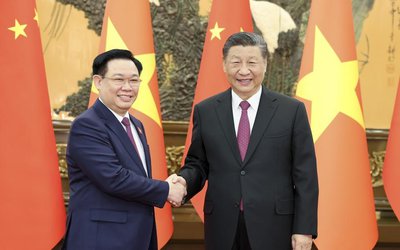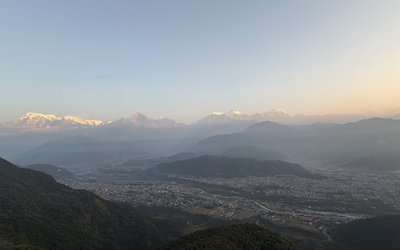No, no, I am not talking about Greater Nepal for just like Akhanda Bharat, this is just a distant dream. I am advocating that our leaders especially PM Oli take a page out of President Trump’s book and do as he says. Whilst our PM is trying his best being hospitable and opening diplomatic relationships all over the world, the President of the USA has embarked on a different path. He no longer follows the adage of a countryman of his who advocated the very successful slogan, ‘How to Make Friends and Influence People’. No DT is just the opposite. His daily onslaughts on Twitter are basically to annoy others and get his own objective fulfilled. His thoughts on Global Warming, which he disputes and his action on raising tariffs against the rest of the world annoy everyone.
To protect the Japanese farmer the Japanese government has always raised tariffs against the import of rice into Japan. It is perhaps because of our open border and agreements with India that we cannot enforce a rule such as this. Once upon a time Nepal was known not only as a rice exporter but also of timber. During World War II, when the British who then ruled India had to transport troops quickly to the war front, it was Nepal which rose to the occasion and supplied timber to lay down the railway lines. Now the situation has changed and it is India and China who are helping us to build railways here!
What is happening in Nepal is that the whole country is being flooded with the agrarian and industrial products from all over the world. It may because we did not have the resources to provide jobs and continuous sources of energy that our young lads left the country to work elsewhere. One hopes that this situation will now change. Some who had gone to distant lands to work have come back with the realisation that if they worked as hard as they were forced to toil in distant lands, they would earn enough for their needs. It is these countrymen who we have help to be able to stand on their own feet. They are taking innovative steps, such as doing agriculture with minimal water or growing new varieties of fruits and vegetables. Sometime ago a vernacular daily gave news of the move to get each household of Nepal to plant or two lime trees in their compound so as to ensure a year round supply of the fruit and to reduce imports from elsewhere. Our Nepali countrymen should be encouraged to live and work in motherland Nepal. Unfortunately a hard working Nepali does not get a fair deal for the efforts that he puts in.
The styles and modes of living in Nepal have changed and are changing further. Though not so for everyone, many of us are spending more and perhaps eating better. It is no secret that prices of food products have sky rocketed recently. Who is making the money? Not the farmer who is producing the product concerned – be it the cereal, fruit, vegetable, poultry or the animal for consumption. It is the middle man, the fixer who imports or buys from the producer in the land at minimal prices and sells to the consumers at exorbitant rates.
It is common practice for sugar factory owners to not weigh the sugarcane brought by the farmers immediately but make the carts wait at the factory gates for a few days so that the cane loses moisture and thus weighs less, thereby giving the farmer a raw deal. Now the problem is different. Sugar from distant lands which cost much less because of mechanisation is displacing the local produce. Sugar produced in Nepal is lying in the godowns whilst the traders are selling off the imported cheaper product at greater profits.
The other day I listened to the difficulties of a farmer in Dhankuta who narrated his tale. Currently he is having difficulties exporting his produce elainchi or tomatoes to India. Rather than sell it at give away prices he is letting his produce rot on the land. He has now reached a stage where he is contemplating giving up farming all together as the government of our land is not farmer friendly. It is not that Nepali farmers are neither innovative nor enterprising. Some are growing fruits such as kiwi, which is new to Nepal. Others are breeding turkeys and ostriches. To protect these domestic farmers, the government has to levy tariffs on food stuffs coming into Nepal from other lands. One reads periodically of the stopping of certain agricultural exports of Nepal e.g. ginger or tomatoes on some pretext or the other at the border. Delay of a day or two can lead to great loss if the goods are perishable. As our trade practices with India or China should be simplified it is also necessary that both our Northern and Southern Big Brothers should make allowances and accept our placing tariffs on their products. Such action should not be taken otherwise but rather as an effort to make the Nepali products more competitive in their own land to enable local farmers to survive. After all our products such as tomatoes, onions and garlic exude a certain aroma or even odour that the imported varieties lack!
These are crucial days for Nepali agriculture. Whilst existing products are not in a position to be sold in the country because of cheaper products from outside, the Nepali farmer presently has to cope with the floods and landslides that the country is going through. Is there a silver lining to the dark clouds that are presently overshadowing us all?

Hemang Dixit
The author writes fiction under the name of Mani Dixit. Website: www.hdixit.org.np. Twitter: @manidixithd
- Top Heavy
- Sep 20, 2023
- Most Able?
- Sep 04, 2023
- Changing Times
- Aug 21, 2023
- Nepali Shenanigans
- Aug 03, 2023
- Budget Naataks
- Jun 29, 2023














